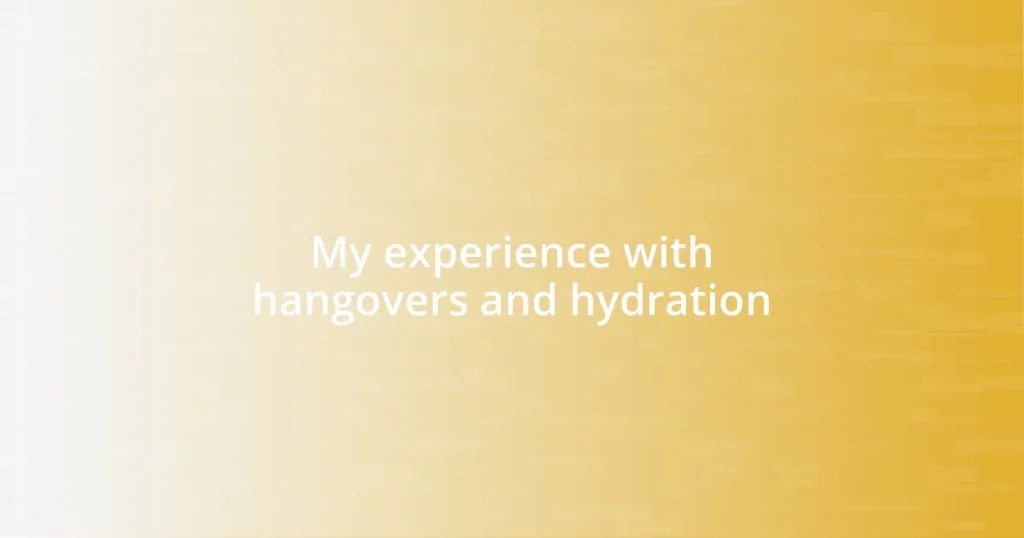Key takeaways:
- Hangovers can cause a range of symptoms including headaches, dehydration, nausea, and emotional distress.
- Alcohol inhibits vasopressin, leading to increased urination and reduced water absorption, exacerbating dehydration.
- Staying hydrated with water and electrolyte-rich drinks, like coconut water or sports drinks, is crucial for recovery.
- Pacing yourself while drinking, eating a hearty meal beforehand, and staying active can help prevent future hangovers.

Understanding hangovers and symptoms
Hangovers can be a real struggle, manifesting in various symptoms that can catch anyone off guard. I’ve been there, waking up to a pounding headache that felt like a marching band was playing in my head. It makes you wonder—why did I think one more drink was a good idea?
The classic signs of a hangover often include dehydration, nausea, fatigue, and that unforgiving sensitivity to light and sound. I remember the time I felt so sluggish that even lifting my head from the pillow felt like an Olympic sport. It’s fascinating how our bodies react to alcohol, isn’t it? Sometimes it feels like they’re sending us a message we just can’t ignore!
Emotional symptoms can also creep in, like anxiety or irritability, which I’ve noticed only amplifies the physical discomfort. After one particularly wild night, I found myself not only dealing with a headache but also replaying my every conversation from the night before, analyzing every silly thing I said. Why do we do that to ourselves? It’s all part of the hangover puzzle, making it clear that our experiences go far beyond mere physical symptoms.
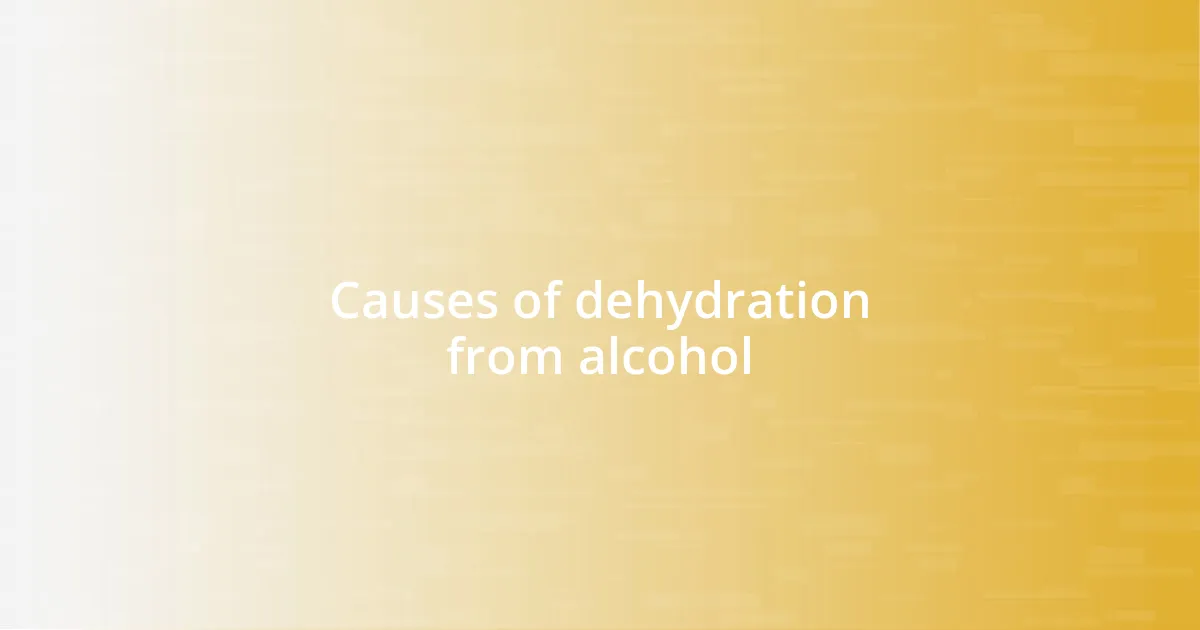
Causes of dehydration from alcohol
One significant cause of dehydration from alcohol is that it inhibits the release of a hormone called vasopressin. This hormone typically helps your body retain water. When I first learned about this, it was a game changer for me. I had always assumed that drinking water while partying would counteract the effects. Little did I know, the alcohol was forcing my body to flush out fluids anyway, leading to that dreaded feeling the next day.
Here are a few key contributors to dehydration caused by alcohol:
- Increased Urination: Alcohol acts as a diuretic, meaning it prompts your kidneys to produce more urine.
- Reduced Water Absorption: Alcohol can disrupt the balance of cells in your body, making it harder for them to absorb the water you do consume.
- Sweating: A night out often involves temperature fluctuations and physical exertion, leading to more sweating.
- Poor Food Choices: After having a few drinks, choosing salty snacks is all too common, which can lead to dehydration.
Reflecting on my own experiences, I remember a night filled with laughter and dancing, but the next morning, I was met with an overwhelming thirst that felt unquenchable. It served as a stark reminder that managing hydration is crucial during any social gathering involving alcohol.
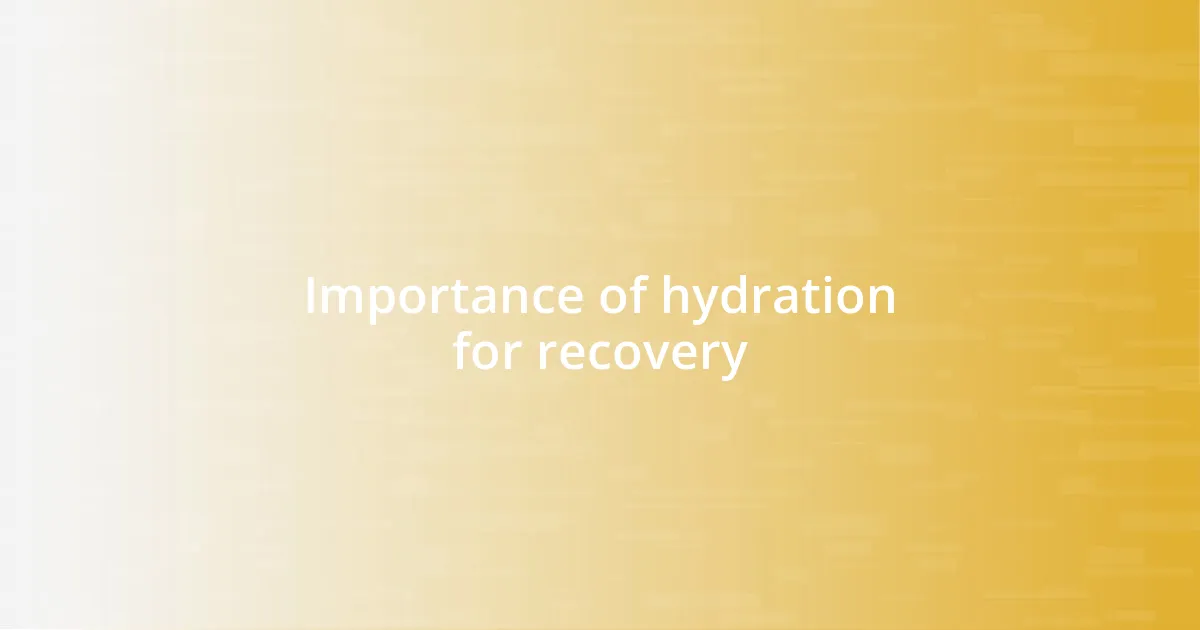
Importance of hydration for recovery
The importance of hydration for recovery cannot be overstated. I’ve found that drinking water can make a world of difference when you’re fighting off a hangover. The moment you realize that every drop counts, you start to appreciate how dehydration heightens the severity of your symptoms. A few hours after a wild night, I’ve often grabbed a glass of water and felt a wave of relief wash over me. It’s like my body is slowly thanking me for finally doing something right!
When I struggled with hangovers, the first thing I discovered was not just the amount of water I needed but also timing. It took me time to understand that sipping water throughout the night improves my chances of waking up feeling somewhat human. I remember a night where I was conscientious about my hydration. Surprisingly, I felt much more energized the next day. It felt almost like a little victory—staying ahead of the hangover curve!
Moreover, beyond just water, replenishing electrolytes can be incredibly beneficial. I’ve experimented with coconut water and sports drinks, and there was a noticeable difference in my recovery. Whenever I add these to my hydration mix, it’s like providing my body with a fuel boost rather than just quenching my thirst. It’s fascinating how simple hydration strategies can shift your hangover experience.
| Hydration Strategy | Effect on Recovery |
|---|---|
| Water | Helps alleviate headache and fatigue |
| Electrolyte Drinks | Replaces lost electrolytes, improving energy levels |
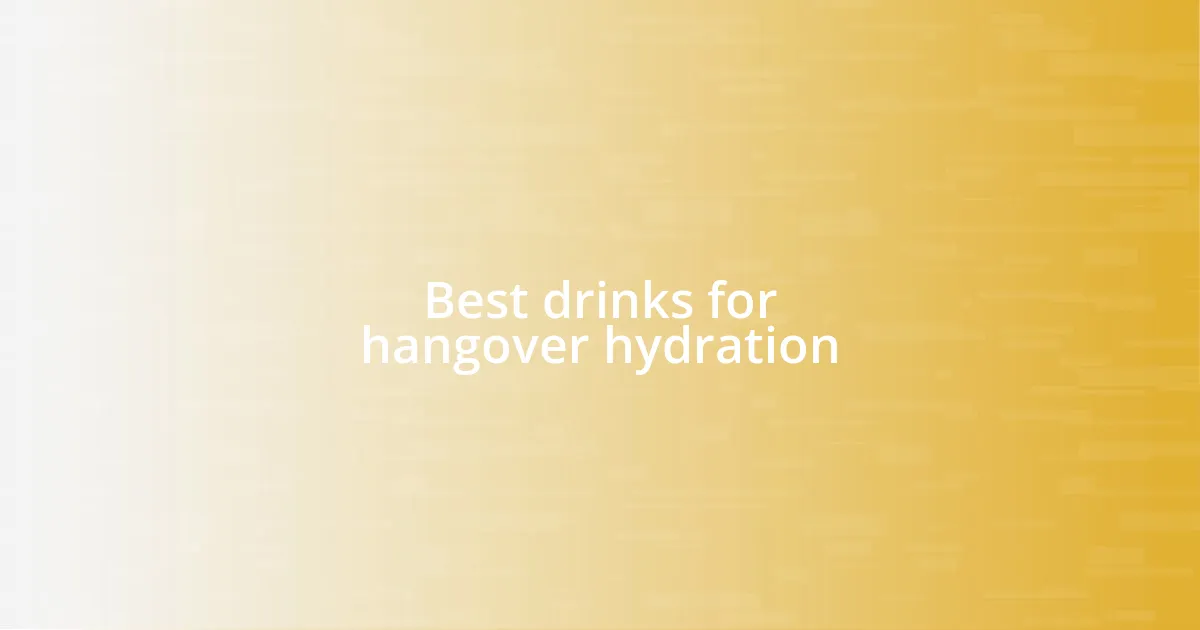
Best drinks for hangover hydration
There’s something incredibly restorative about the right drinks after a night of indulgence. From my experience, coconut water has become my go-to remedy. Its natural sugars and high potassium content really help me bounce back, almost like a gentle hug for my dehydrated cells. I remember one particularly rough morning, and sipping that refreshing drink felt like a revelation; it was hydration and a treat all in one.
While coconut water does wonders, I’ve also found that a good sports drink can work wonders in a pinch. The electrolytes in these beverages can be magical in replenishing what you’ve lost. I’ve had mornings when all I could manage was to sip on a sports drink while lounging on the couch, and simply feeling those electrolytes reinvigorate me was priceless. Isn’t it amazing how a little bit of thoughtful hydration can shift the tide of a hangover?
For something a bit more comforting, warm herbal teas have also been on my recovery list. I vividly recall sitting wrapped in a blanket, cradling a mug of ginger tea, and feeling my body start to restore itself. The warmth not only soothed my stomach but also provided a sense of calm during that chaotic recovery phase. I often ask friends, “Have you tried a warming tea after a heavy night?” Their surprised reactions always remind me how simple comforts can sometimes be the best remedy.
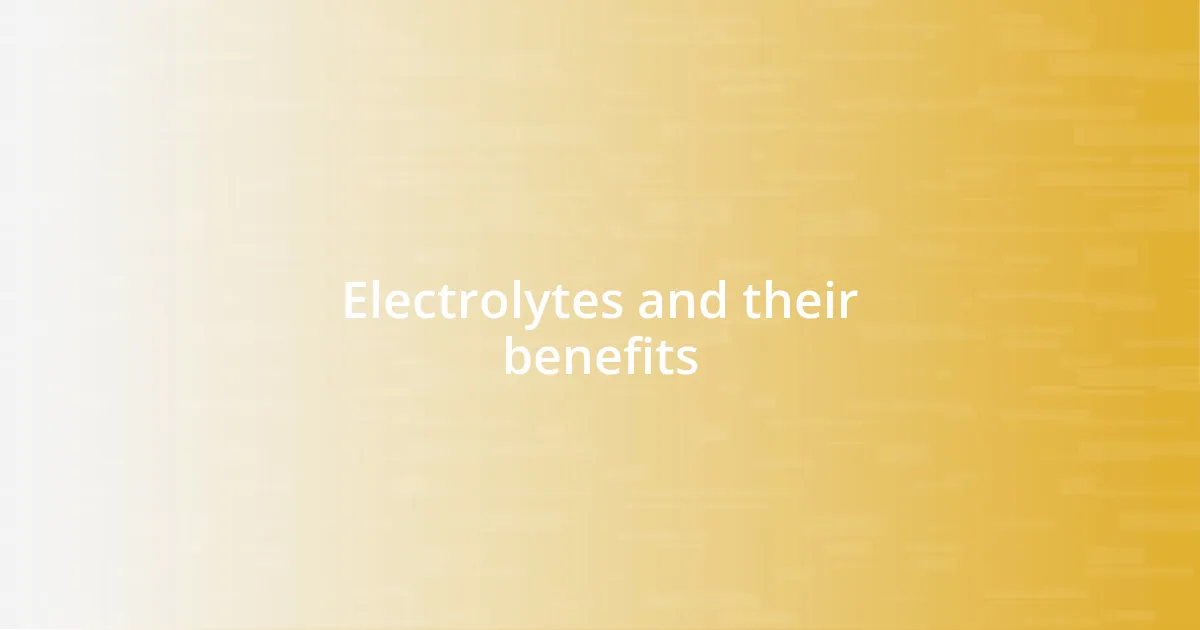
Electrolytes and their benefits
Electrolytes play a crucial role in our body’s ability to function properly, especially after a night of drinking. I remember one hangover when I opted for an electrolyte-rich drink instead of just plain water. The difference was remarkable; I felt like I was slowly recharging my system. It’s fascinating how sodium, potassium, and magnesium—key electrolytes—can help restore balance and alleviate the fog that often comes with a hangover.
When I think back on my early hangover recovery days, I often cringe at how little I knew about the importance of electrolytes. One morning, after drinking some coconut water, it felt like my body was bursting with energy again. Have you ever had that moment when you realize you’ve found something that actually works for you? It was a game changer; replenishing those lost electrolytes truly transformed my recovery process.
Incorporating electrolytes into my recovery routine has not only helped physically but emotionally, too. I recall sitting at the breakfast table, feeling less like a zombie and more like I could tackle my day ahead. It’s remarkable how something as simple as a drink can make you feel alive again, isn’t it? Those moments remind me that taking care of myself after a night of indulgence is not just about the immediate fix, but about nurturing my overall well-being.
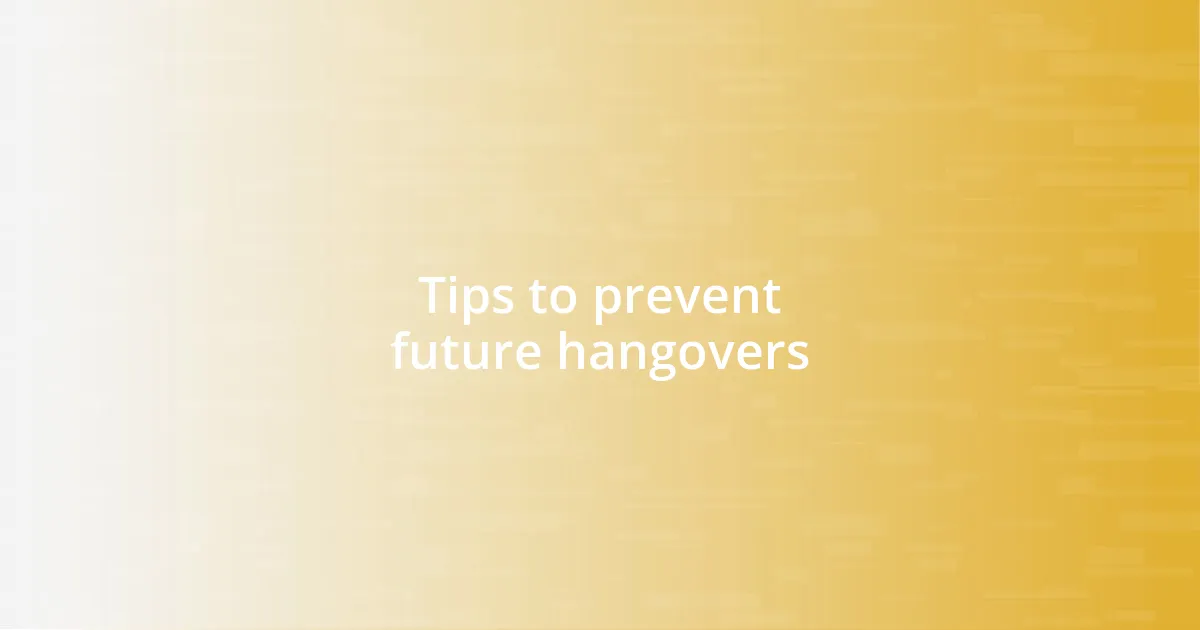
Tips to prevent future hangovers
Keeping hangovers at bay starts long before you hit the drinks. One strategy that I swear by is to pace myself throughout the night. Have you ever felt that urge to keep going strong? I used to fall into that trap, and it never ended well. Now, I set a limit and opt for a glass of water between each drink. Not only does this keep me hydrated, but it also allows me to savor the evening rather than rush through it.
On the food front, choosing wisely can have a surprising impact. I’ve made it a point to always eat a hearty meal—like a big bowl of pasta—before a night out. I remember a memorable birthday dinner where I indulged in a rich, carb-loaded feast. It created a protective layer in my stomach that seemed to fend off the worst hangover effects. Have you tried that? It’s almost like treating your body with the care it deserves before putting it through the wringer.
Finally, my mantra is “stay active.” You might think that after a night of heavy drinking, relaxation is the way to go, but I’ve found that a light workout or even a brisk walk the next day boosts my mood and circulation. I vividly recall a time I forced myself out for a short jog, despite feeling like lead. It was tough to start, but afterward, I felt such a surge of clarity. I often wonder if it’s just me, or if others find the same—does physical activity help you shake off that hangover haze too? The connection between movement and mood is something I now prioritize whenever I need to recover.
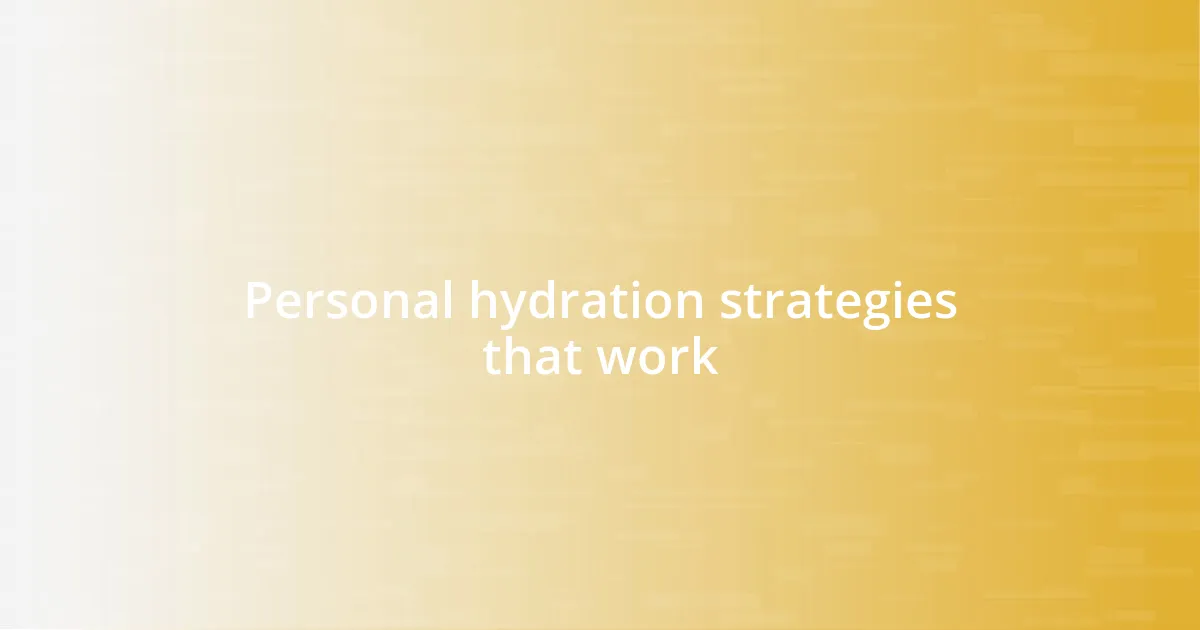
Personal hydration strategies that work
One hydration strategy I’ve learned over the years is the power of flavor. I used to think plain water was my only option, but adding a splash of lemon or a few slices of cucumber transforms the experience. I remember one particularly groggy morning when I infused my water with mint leaves. The refreshing taste not only made it easier to drink but also felt revitalizing. Have you ever noticed how something as simple as flavor can make staying hydrated feel less like a chore?
I’ve also discovered the benefits of keeping a hydration bottle within arm’s reach at all times. It’s a simple habit that has made a huge difference in my daily routine. With a stylish, insulated water bottle always nearby, I find myself sipping more throughout the day without even realizing it. I recall a time I took my bottle to work, and by lunch, I was pleasantly surprised to see it empty, feeling a sense of accomplishment. Doesn’t it feel good to check off a small wellness goal?
Finally, gulping down hydration drinks right before bed has become part of my recovery plan. I remember one night after a friend’s birthday bash; I took the extra step of downing a sports drink before curling up. As the night progressed, I felt assured that I was prepping my body to handle the next day. Have you ever woken up after a night out, feeling surprisingly less worse for wear? That little ritual has helped me wake up ready to face whatever the day throws my way, and it’s a habit I can’t recommend enough.










